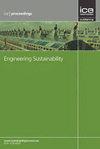在强制性和可选旅行中接受自动驾驶汽车背后的决定因素
IF 1.5
4区 工程技术
Q3 ENGINEERING, CIVIL
Proceedings of the Institution of Civil Engineers-Engineering Sustainability
Pub Date : 2023-09-01
DOI:10.1680/jensu.23.00023
引用次数: 0
摘要
由于自动驾驶汽车(AVs)有可能从根本上改变交通系统,因此有必要调查影响用户使用意愿的因素。虽然以往的研究大多集中在潜在变量的内部信念图式上,但本文旨在通过整合技术接受与使用统一理论(UTAUT)的变量以及环境关注和感知风险来研究内外部因素的影响。此外,还比较了潜在变量对不同旅行目的(强制性和可选性)的影响,这在以往的研究中较少受到关注。使用声明偏好调查,收集了德黑兰公民的641份有效答复。结构方程模型的估计结果显示,自动驾驶汽车接受的决定因素在强制性和可选行程之间存在显著差异。估计系数表明,社会影响和绩效预期分别是自选出行和强制出行中使用自动驾驶汽车意愿的最强解释因素。然而,在两种出行类型中,环境问题对使用自动驾驶汽车意愿的影响没有显著差异。本文章由计算机程序翻译,如有差异,请以英文原文为准。
Determinants behind the acceptance of autonomous vehicles in mandatory and optional trips
Due to the potential of Automated Vehicles (AVs) to radically change the transportation system, it is essential to investigate the factors affecting users’ intention to use. Although previous studies have mostly focused on internal schema of beliefs in latent variables, this paper aims to examine the impact of internal and external factors by integrating variables of Unified Theory of Acceptance and Use of Technology (UTAUT) along with environmental concern and perceived risk. Moreover, the effect of latent variables is also compared for different trip purposes (mandatory and optional) that received less attention in previous studies. Using stated preference survey, 641 valid responses from Tehran citizens have been collected. Estimation results of Structural Equation Modelling show a significant difference between the determinants of AVs acceptance across mandatory and optional trips. Estimated coefficients indicate that social influence and performance expectancy are the strongest explanatory factors in intention to use AVs on optional and mandatory trips, respectively. However, no significant difference is observed for the impact of environmental concern on intention to use AVs across both trip types.
求助全文
通过发布文献求助,成功后即可免费获取论文全文。
去求助
来源期刊

Proceedings of the Institution of Civil Engineers-Engineering Sustainability
ENGINEERING, CIVIL-ENGINEERING, CIVIL
CiteScore
3.70
自引率
16.70%
发文量
44
审稿时长
>12 weeks
期刊介绍:
Engineering Sustainability provides a forum for sharing the latest thinking from research and practice, and increasingly is presenting the ''how to'' of engineering a resilient future. The journal features refereed papers and shorter articles relating to the pursuit and implementation of sustainability principles through engineering planning, design and application. The tensions between and integration of social, economic and environmental considerations within such schemes are of particular relevance. Methodologies for assessing sustainability, policy issues, education and corporate responsibility will also be included. The aims will be met primarily by providing papers and briefing notes (including case histories and best practice guidance) of use to decision-makers, practitioners, researchers and students.
 求助内容:
求助内容: 应助结果提醒方式:
应助结果提醒方式:


